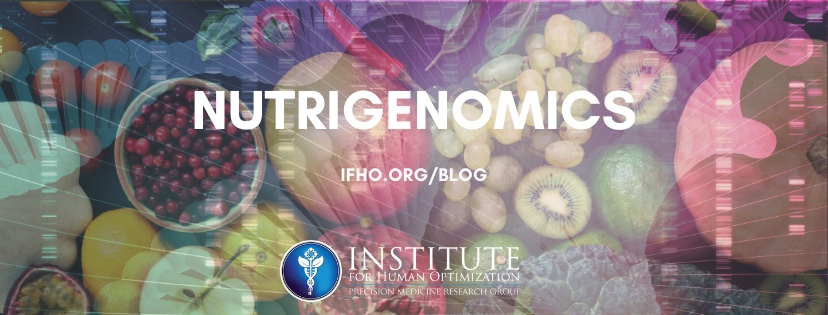NUTRIGENOMICS – Advancing personalized medicine
As people age, diet and lifestyle play more prominent roles in the development of diseases than do genetics. The study of nutrigenomics is helping us visualize and understand the subtle, yet the profound connection between our genetic blueprint and the food and nutrients we put into our bodies.
. . .
A long history
As far back as 400 B.C., it is believed that Hippocrates said to physicians: ‘Leave your drugs in the chemist’s pot if you can heal your patient with food.’ Today, Dr. Mark Hyman says, “Food is the code that programs your biology. You can literally upgrade or downgrade your biological software with what you choose to eat.” Every bite you eat is either fighting disease or feeding it.
It has long been known that individuals can differ in their requirements for a given nutrient. Back in 1956, Dr. Roger Williams coined the phrase and wrote the book, Biochemical Individuality, which illustrated how it “related to differing nutritional needs for optimal function among different people. He pointed out that even identical twins could be different in their needs for optimal function based upon the fact that they developed in different environments in utero. Although identical twins share the same genes, their differing nutrition and developmental environments can result in different expression of the genes as they grow older.”
When Williams’ book was republished in 1988, Dr. Jeffrey Bland, wrote in the forward, “. . . Dr. Williams [recognized] that nutritional status can influence the expression of genetic characteristics. Once again Dr. Williams foresaw this important concept in Biochemical Individuality and set in motion research and discoveries . . . that have transformed medicine.”
Some basic definitions
Genetics is the study of heredity and inherited characteristics. It often assesses single genes within congenital disorders, such as cystic fibrosis, muscular dystrophy, etc.
The National Human Genome Research Institute defines genomics as, “the study of all of a person’s genes (the genome), including interactions of those genes with each other and with the person’s environment.”
According to Nature Research, nutrigenomics is “the study of the effects of food and food constituents on gene expression, and how genetic variations affect the nutritional environment. It focuses on understanding the interaction between nutrients and other dietary bioactives with the genome at the molecular level, to understand how specific nutrients or dietary regimes may affect human health.”
Why is this important?
We’re all aware that specialized supplements, natural products, and a healthy diet have been used over the years and have been effective for many people. What if you could find out which nutrients, from food and/or supplements, would be specifically indicated for you based on your genes? Wouldn’t that be valuable information to have?
On page 102 in my book, The Longevity Equation, I raise the point that there is no one-size-fits-all diet. Each person has a complex variation of genes that influence which diet is optimal to stay lean, feel energized, and avoid disease. It’s important to understand that diet and lifestyle choices have a significant impact on the way your genes function. While your genes themselves won’t change, which ones are activated and deactivated can change. The study of nutrigenomics focuses on the way genes and nutrition affect one another.
“For instance, with the variant 164A>C of the CYP1A2 gene, often, a person will have a high sensitivity to caffeine, which can lead to high blood pressure and increased risk of heart disease. While most people won’t have a problem with caffeine, people with this gene will want to avoid it at all costs . . .
Since different diets produce different results for everyone, it’s vital that you determine the optimal diet for your specific biology. The only way to do this is to gain insight into what’s happening in your genetic coding. The best way to gain insight into your genetic coding is to do a genetic test.
In order for treatment to be specific and personalized, The Institute for Human Optimization looks at the single nucleotide polymorphisms (SNP – pronounced ‘snip’) within a person’s genome. A SNP is a DNA sequence variation that occurs when a single nucleotide (the building blocks of DNA) in the genome sequence is altered. SNPs do not cause disease, but they can help determine the likelihood that someone may develop a certain illness. SNPs largely influence our biochemical individuality, which is central to the practice of precision functional medicine. We assess the pattern analysis of a multitude of different SNPs.
Something like 99.6% of the human genome is identical in all people. This is true of everyone, regardless of race or heritage. However, it is at the SNP location that variation does take place. SNPs only make up a tiny portion of the genome (0.4%) but because the genome is so enormous, this equals over 12 million locations. It’s the differences at these SNP locations that make each of us unique.
There are many existing and new apps that measure single SNPs and make generalized recommendations, but they’re not personalized to the level that they should be. They are limited in what they can provide to customers legally, and their reporting is incomplete and broad.
What can the testing tell me?
Dr. Mark Hyman is known for using the phrase, “Genetics loads the gun, but lifestyle/environment pulls the trigger.” Our genes aren’t our destiny. The choices we make can determine how they are expressed. Even if we’re predisposed to a specific disease, we can potentially stop that from becoming reality by looking at SNPs and the specific pathways they affect.
In a 2007 research review, two doctors concluded that, “Effects of genetic diseases previously considered untreatable may now be ameliorated by administering higher amounts of the coenzyme(s) required for more efficient metabolic function. Through genetic and functional testing . . . risk factors may be identified and truly personalized interventions to improve health designed.”
The Institute for Human Optimization uses a test called GenomicInsight®, which combines today’s most advanced DNA testing with the powerful Opus23 Explorer® interface to produce the perfect combination of DNA testing, science, and current research.
Opus23 Explorer® scans over 20 peer-reviewed, evidence-based scientific databases, including metabolic pathways, etiological associations, and pharmacogenomic databases, and cross-references their information with the results of your GenomicInsight® raw data. This report summarizes important findings from your genomic data that will be curated by your clinical team into an easy-to-understand format.
How can The Institute for Human Optimization help me?
Using Opus23 Explorer® requires a highly-trained and specialized clinician to interpret and curate the data for the patient. Our clinicians will put your data in the appropriate context, taking into account your medical history, your stressors, your diet, your lifestyle, and so forth. So much data is available through this incredible analysis platform that your information will constantly be updated like a living document, as new research is done, new literature is published, and new discoveries are made.
Opus23 Explorer® assesses over 900,000 SNPs, but we only focus on 6,000 or so that have been clinically curated and shown to have an impact on disease progression and quality of life. Based on your genomic data, the platform allows our clinicians to assess the efficacy of natural products and foods that may be worthy of attention as potentially valuable therapeutic agents. The platform uses a combination of evidence-based medicine and your genomics to compile the most clinically applicable data that makes nutritional recommendations specific to YOU.
There is also another level to our testing that adds on microbiome analysis and integrates it with your genomic data. In an earlier blog we mention that your microbiome regulates 99% of your gene expression! The test will tell us how your body is integrating your lifestyle and environment with the genetic blueprint you were born with, and make recommendations accordingly!
The promise of precision medicine begins with your story. We provide the most comprehensive, data-driven approach to wellness. It is:
- Predictive – We use genomics and advanced biomarker testing for risk stratification and empowerment.
- Personalized – We use data-driven health information to curate actionable change for disease mitigation and prevention.
- Preventive – We utilize highly individualized programs tailored to your unique genomic blueprint.
- Participatory – We empower engagement in personal choices, which allows for improved outcomes and enhanced results.
Let’s discover your personalized nutrition plan together!





Leave a Reply
Want to join the discussion?Feel free to contribute!